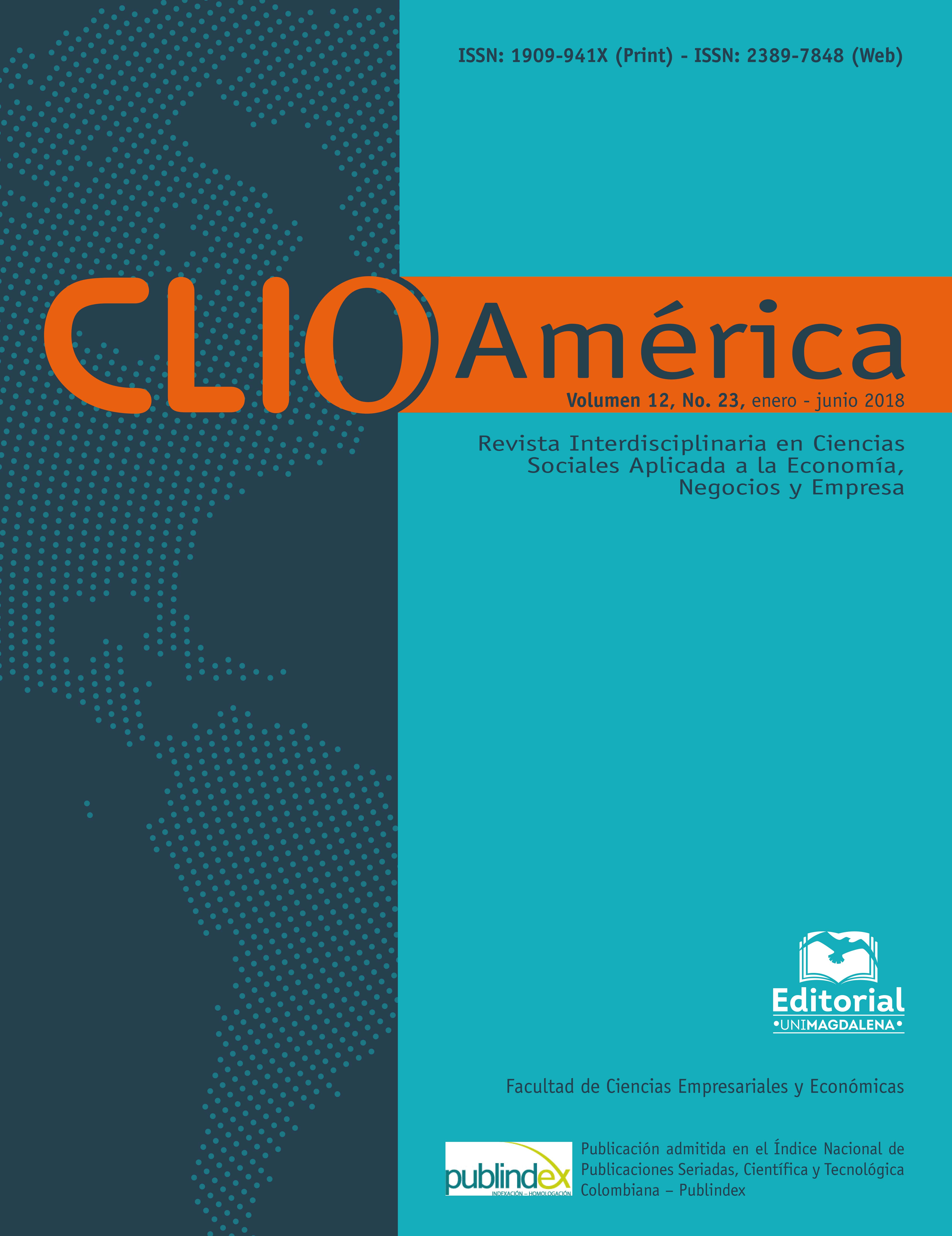Evaluación de la lógica dominante del servicio para el caso de los seguros de automóviles en Colombia
Contenido principal del artículo
Resumen
Descargas
Detalles del artículo
Esta revista proporciona un acceso abierto a su contenido, basado en el principio de ofrecer al público un acceso libre a las investigaciones ayuda a un mayor intercambio global del conocimiento. De igual forma su versión impresa es de libre acceso y no tiene costos asociados por publicación.
Citas
Aarikka-Stenroos, L. y Jaakkola, E. (2012). Value co-creation in knowledge intensive business services: A dyadic perspective on the joint problem solving process. Industrial Marketing Management, 41(1), 15-26. https://doi.org/10.1016/j.indmarman.2011.11.008
Andrus, D. M. y Hall, C. (2003). Services marketing: integrating customer focus across the firm (3rd ed.). Boston: McGraw-Hill/Irwin.
Ballantyne, D. y Varey, R. (2008). The service-dominant logic and the future of marketing. Journal of the Academy of Marketing Science, 36(1), 11-14. https://doi.org/10.1007/s11747-007-0075-8
Barile, S., Saviano, M. y Polese, F. (2014). Information asymmetry and co-creation in health care services. Australasian Marketing Journal, 22(3), 205-217. https://doi.org/10.1016/j.ausmj.2014.08.008
Baxter, R. (2012). Chapter 5 Availability of Resources through Buyer–Seller Relationships. En M. S. Glynn y A. G. Woodside (Ed.), Business-to-Business Marketing Management: Strategies, Cases and Solutions. Advances in Business Marketing and Purchasing, 18, (pp. 119-140). Boston, USA: Emerald Group Publishing Limited. Recuperado de https://doi.org/10.1108/S1069-0964(2012)0000018010
Bitner, M. (1992). Servicescapes: the impact of physical surroundings on customers and employees. Journal of Marketing, 56(2), 57-71. https://doi.org/10.2307/1252042
Bitner, M., Booms, B. y Stanfield, M. (1990). The service encounter: Diagnosing favorable and unfavorable incidents. Journal of Marketing, 54(1), 71–84. https://doi.org/10.2307/1252174
Carbone, L. y Haeckel, S. (1994). Engineering customer experiences. Marketing Management, 3(3), 8. Recuperado de https://www.researchgate.net/publication/265031917_Engineering_Customer_Experiences
Dalkey, N., Brown, B. y Cochran, S. (1970). The Delphi Method, III: Use of self rating to improve group estimates. Recuperado de https://www.rand.org/content/dam/rand/pubs/research_memoranda/2006/RM6115.pdf
Dza, M., Fisher, R. y Gapp, R. (2013). Service-dominant logic and procurement in Africa: Lessons learned from a development agenda in ghana. International Journal of Economic Policy in Emerging Economies, 6(2), 141-157. https://doi.org/10.1504/IJEPEE.2013.055794
Edvardsson, B. (2005). Service quality: beyond cognitive assessment. Managing Service Quality: An International Journal, 15(2), 127-131. https://doi.org/10.1108/09604520510585316
Fefer, J., Urioste de, S., Daigle, J. y Silka, L. (2016). Using the Delphi technique to identify key elements for effective and sustainable visitor use planning frameworks. SAGE Open, 6(2). https://doi.org/10.1177/2158244016643141
Flint, D., Lusch, R. y Vargo, S. (2014). The supply chain management of shopper marketing as viewed through a service ecosystem lens. International Journal of Physical Distribution and Logistics Management, 44(1), 23-38. https://doi.org/10.1108/IJPDLM-12-2012-0350
García, N., Álvarez, B. y Santos, M. (2011). Aplicación de la lógica dominante del servicio (LDS) en el sector turístico: el marketing interno como antecedente de la cultura de co-creación de innovaciones con clientes y empleados. Cuadernos de Gestión, 11(2), 53-75. https://doi.org/10.5295/cdg.100238ng
Grönroos, C. (2006). Adopting a service logic for marketing. Marketing Theory, 6(3), 317-333. https://doi.org/10.1177/1470593106066794
Grönroos, C. y Gummerus, J. (2014). The service revolution and its marketing implications: Service logic vs service-dominant logic. Managing Service Quality, 24(3), 206-229. https://doi.org/10.1108/MSQ-03-2014-0042
Helkkula, A., Kelleher, C. y Pihlström, M. (2012). Practices and experiences: challenges and opportunities for value research. Journal of Service Management, 23(4), 554-570. https://doi.org/10.1108/09564231211260413
Jaakkola, E., Helkkula, A. y Aarikka-Stenroos, L. (2015). Service experience co-creation: conceptualization, implications, and future research directions. Journal of Service Management, 26(2), 182-205. https://doi.org/10.1108/JOSM-12-2014-0323
Kent, M. y Saffer, A. (2014). A Delphi study of the future of new technology research in public relations. Public Relations Review, 40(3), 568-576. https://doi.org/10.1016/j.pubrev.2014.02.008
Kim, J. y Hardin, A. (2010). The impact of virtual worlds on word-of-mouth: Improving social networking and servicescape in the hospitality industry. Journal of Hospitality Marketing and Management, 19(7), 735-753. https://doi.org/10.1080/19368623.2010.508005
McDougall, G. y Levesque, T. (2000). Customer satisfaction with services: putting perceived value into the equation. Journal of Service Marketing, 14(5), 392-410. https://doi.org/10.1108/08876040010340937
Ng., I. y Smith, L. (2012). An Integrative Framework of Value. En S. L. Vargo y R. F. Lusch (Ed.), Special Issue – Toward a Better Understanding of the Role of Value in Markets and Marketing. Review of Marketing Research, 9, (pp. 207-243). Boston, USA: Emerald Group Publishing Limited. Recuperado de https://doi.org/10.1108/S1548-6435(2012)0000009011
Payne, A., Storbacka, K. y Frow, P. (2008). Managing the co-creation of value. Journal of the Academy of Marketing Science, 36(1), 83-96. https://doi.org/10.1007/s11747-007-0070-0
Payne, A., Storbacka, K., Frow, P. y Knox, S. (2009). Co-creating brands: Diagnosing and designing the relationship experience. Journal of Business Research, 62(3), 379-389. https://doi.org/10.1016/j.jbusres.2008.05.013
Perrone, A. (2009). How servicescape enhances service quality. International Journal of Knowledge, Culture and Change Management, 9(2), 103-111. https://doi.org/10.18848/1447-9524/CGP/v09i02/49696
Regimen de Protección al consumidor Financiero (Ley 1328 DE 2009). Diario Oficial No. 47.411 de 15 de julio de 2009.
Silva, J. y Nájera, A. (015). Resultados de la industria aseguradora al mes de septiembre del 2015. Revista Fasecolda, (161), 66-71. Recuperado de https://revista.fasecolda.com/index.php/revfasecolda/article/view/189
Silva, J. y Nájera, A. (2016). Resultados de la industria aseguradora en el año 2015. Revista Fasecolda, (163), 34-41. Recuperado de http://www.fasecolda.com/files/3614/6548/0848/revistaFasecolda163.pdf
Tronvoll, B. (2007). Customer complaint behaviour from the perspective of the service-dominant logic of marketing. Managing Service Quality, 17(6), 601-620. https://doi.org/10.1108/09604520710834966
Vanegas, V. y Varela, C. (2011). Seguro de daños. Seguro de Automóviles: Evolución y Comportamiento del Ramo de Automóviles. En Fasecolda (Ed. de la serie), La Industria Aseguradora en Colombia: Tomo II (pp. 352-395). Recuperado de http://www.fasecolda.com/files/4413/9101/6737/seguro_de_automoviles.pdf
Vargo, S. y Lusch, R. (2004). Evolving to a New Dominant Logic for Marketing. Journal of Marketing, 68(1), 1-17. https://doi.org/10.1509/jmkg.68.1.1.24036
Vargo, S. y Lusch, R. (2008). Service-dominant logic: Continuing the evolution. Journal of the Academy of Marketing Science, 36(1), 1-10. https://doi.org/10.1007/s11747-007-0069-6
Vargo, S. y Lusch, R. (2014). Inversions of service-dominant logic. Marketing Theory, 14(3), 239-248. https://doi.org/10.1177/1470593114534339
Vargo, S. y Lusch, R. (2016). Institutions and axioms: an extension and update of service-dominant logic. Journal of the Academy of Marketing Science, 44(1), 5-23. https://doi.org/10.1007/s11747-015-0456-3

